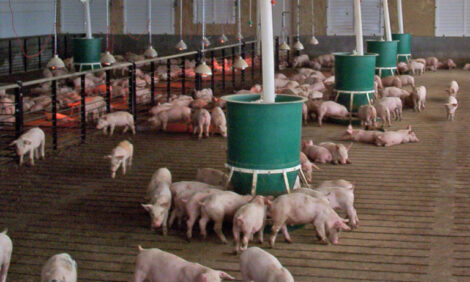



Disease Eradication Initiative in Pigs
Summary by Jennifer Kate Waters of her thesis for a degree of Master of Research Science at the University of Leeds Institute of Integrative and Comparative Biology at the Faculty of Biological Sciences, completed in September 2010.The Yorkshire and Humberside Pig Health Scheme (YHH) was an initiative created
to increase the health and welfare of pigs in the region. Disease remains the most
detrimental factor to the health and welfare of pigs and as such the YHH focused
on four chronic diseases, namely, Porcine Reproductive and Respiratory
Syndrome, Enzootic Pneumonia, Swine Dysentery and Mange with a view to
eradication.
The YHH believed the best way to achieve their aims was to provide a
framework thereby enabling all industry stakeholders to participate and collaborate
with each other. From this, reasons as to both why and how the disease could be
spread could be identified and subsequent solutions could be proffered to
effectively combat disease and spread.
The scheme was split into two stages;
Stage One lasted approximately one year and planned the implementation
protocols and provided the foundations for Stage Two. Stage Two will continue on
from this indefinitely, applying appropriate measures until the four diseases have
been eradicated from the region.
This work focuses on assessing the effectiveness and success of Stage One of the
YHH and two pilot studies. Stage One of the YHH generated producer involvement,
the creation of three clusters of farms and support from numerous industry
stakeholders. It can be argued that Stage One as successful on the grounds that
the YHH received further funding to progress on to Stage Two. However, there
were areas in which Stage One could have been more efficient and a blueprint
suggesting key components for a successful Stage One are provided in this work.
Any future eradication schemes would benefit from utilising the recommendations
provided in this blueprint. This work also provides recommendations for alterations
that are hoped to benefit Stage Two.
Two pilot schemes ran parallel to the YHH and provided the scheme with essential
information, these are assessed. First, the Veterinary Pilot Study; this assessed the
veterinarians’ capability at determining disease presence within a herd, through
comparison with diagnostic sampling. It was concluded that the veterinarians that
participated were fully capable at diagnosing disease presence in a herd. The
Veterinary Pilot Study also generated information regarding the location of many
herds in the region.
Second, an alternative sampling technique was trialled using colostrum as an alternative to blood serum for antibody testing. It was concluded that further investigation into the creation of more accurate diagnostic tests was
required before colostrum could become an alternative to blood serum sampling.
Further ReadingYou can view the full report by clicking here. |
Further ReadingFind out more information on the diseases mentioned in this article by clicking here. |
July 2012








